Northcliffe ironman great Zane Holmes reflects on his humble beginnings, his career and life post racing in this week’s Q&A
Zane Holmes has won every major ironman race there is to win. From humble beginnings at Northcliffe nippers, the Holmes name is now mentioned in the same breath as names like Trevor Hendy, Grant Kenny and Darren Mercer.
Local sport
Don't miss out on the headlines from Local sport. Followed categories will be added to My News.
Zane Holmes has won every major ironman race there is to win. From humble beginnings at Northcliffe nippers, the Holmes name is now mentioned in the same breath as names like Trevor Hendy, Grant Kenny and Darren Mercer.
HANGING WITH MATES
What is your first memory of taking part in Nippers?
It would be ... I was at Northcliffe surf club. I just remember hanging out with my mates. I had two really good friends I was at Nippers with so I remember hanging out with my mates. I wasn’t that fussed about doing Nippers, more so the chance to hang out with my mates and get down to the beach.
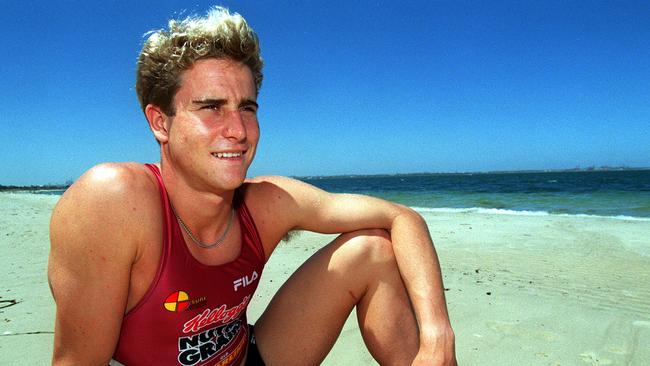
Your dad John was an Australian champion himself. Did you feel any pressure to try to step out of his shadow?
No. You don’t even know as a kid what’s come before you. I had two older sisters as well that were involved. For me, it was a real family environment down at Northcliffe. My mum and dad were involved a fair bit. There was never any pressure, that’s for sure. I was always competitive by nature so I used to put a lot of pressure on myself to do well and win but not because of previous successors in my family.
AT THE CROSSROADS
Were you one of the kids who took to it straight away and started to get results early?
I guess I was. Being the youngest in the family, I was down at the beach in my nappy. When I was old enough to join Nippers, I did it the first year but none of my mates did. I only did it for a year and then I didn’t want to do it anymore. I did it when I was six then didn’t do it the following year when I was seven until my other mates joined. Then I was into it because they were all involved as well. I had a head start on everyone else because I was down there so early on.
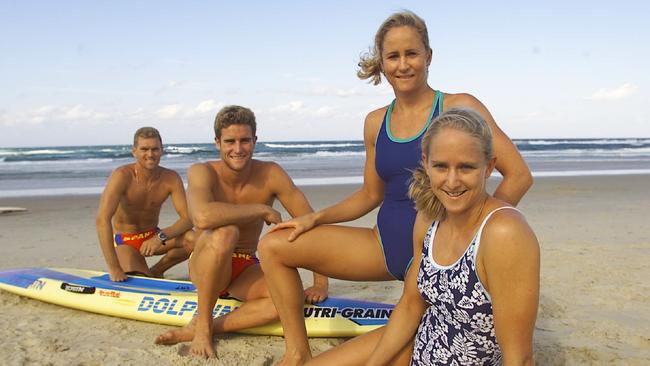
Was there a moment when you decided you wanted to be a professional ironman?
There was and I remember it clearly. I was 16 and I was into surfing as well, doing small comps and that but I was better at surf lifesaving. I was at a bit of a crossroads (and) didn’t know what I was going to do. I must have had a pretty good Aussie titles and then I just decided that’s what I was going to do. I remember thinking that I wanted to be the best ironman in Australia.
GOLDEN CAREER
You’ve won world ironmans, Australian ironmans, Queensland ironmans Nutri-Grain series and a Coolangatta Gold, but is there a win or a career highlight you put above everything?
Probably the Coolangatta Gold only because I didn’t ever think I would or could win it. I thought I’d be happy with a podium finish but to win it (in 2006) was amazing. It’s such a hard event to win as well.
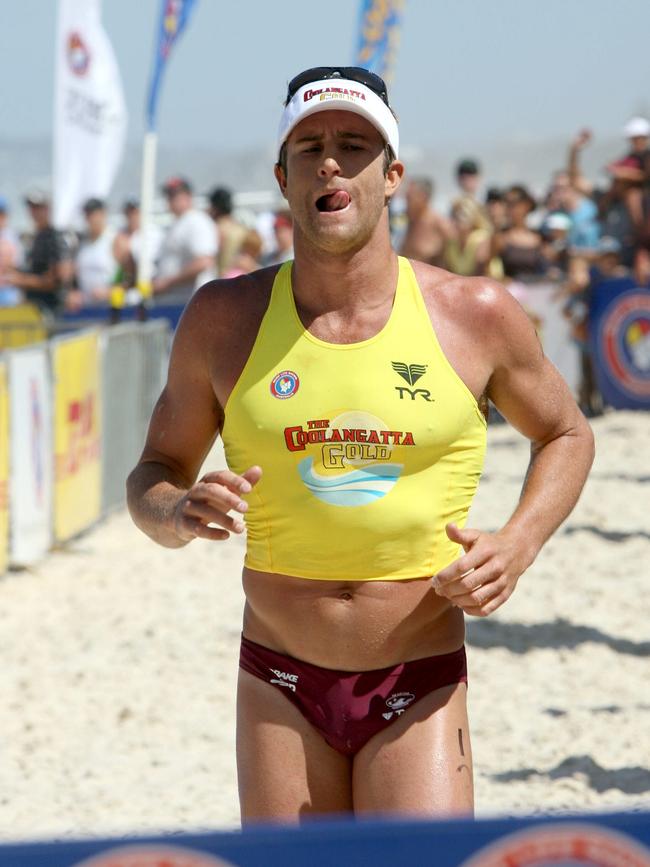
You also started your own event, the Wave Warriors Junior Challenge. How did that idea come about?
It came about when I was still competing myself. Nipper carnivals are pretty mundane and slow. Parents are always complaining about them and I thought it doesn’t have to be that way. We ran it professionally and efficiently and we got so much praise from parents saying it’s the best carnival they’ve been involved in. We ran it for five years and had seven events around the country at one point. We had good backing from medibank but that partnership ended, they decided to go a different way. We’re trying to get it up and running but we’re trying to find a sponsor who will help support it to a level we want it to be run.
TIDES OF CHANGE
You began to rise to prominence right at the end of the Uncle Toby’s era in the late 90’s. I guess you were just hitting your peak as public interest began to dwindle but what were the first signs of change for you?
I guess it was the money. When I first started, there was more money and more opportunities to win money so I saw that stuff drop a little when the Uncle Toby’s folded. The Sydney Olympics (in 2000) affected it as well. The sponsorship dollars went into the Games and Olympic sports so sports like ironman suffered.
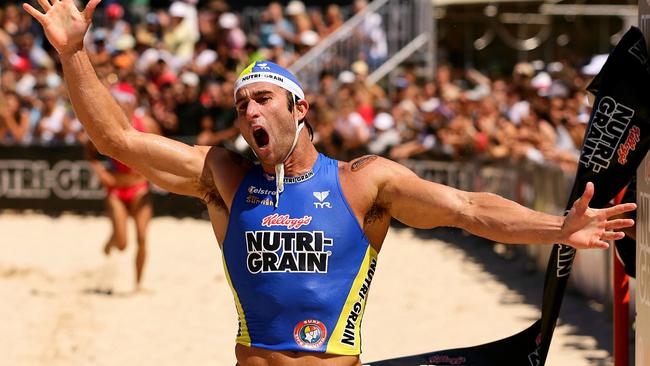
Do you think the sport will ever return to its glory days?
It’s a hard question because I’d love to see that. I think the internet is another reason that’s contributed to the sport dwindling. Back when Uncle Toby’s and Nutri-Grain were at their peak, there wasn’t really any other sports you could stream. There was your core, athletics, swimming, Olympic sports and then there were football, cricket and that’s all that was on TV as well as ironman racing. So in summer, you could watch cricket and ironman. They were the two main sports on TV. There was no internet for people to watch anything else. Now, with the livestreaming and everything, you can watch sport from all over the world at any time. There’s a lot more competitions for the consumer when it comes to watching the top competitions. Unfortunately the sport doesn’t have the money to promote it properly.
MASTER AND APPRENTICE
Who was the best competitor you ever raced against?
It’s got to be Shannon Eckstein. Just because we just had such a long rivalry over many years. We used to train together as well. I can’t remember how many years but there was a few years there where nobody else won a race during that time other than myself or Shannon. It was back and forth. He’d have a good run and I’d come back and have a good run. When I put my foot on the line, I knew that I could beat everyone else on the line. I wasn’t worried about anyone else except for Shannon. I knew I had to have a good day to beat him. I knew I could beat anyone else in the field on an average day.
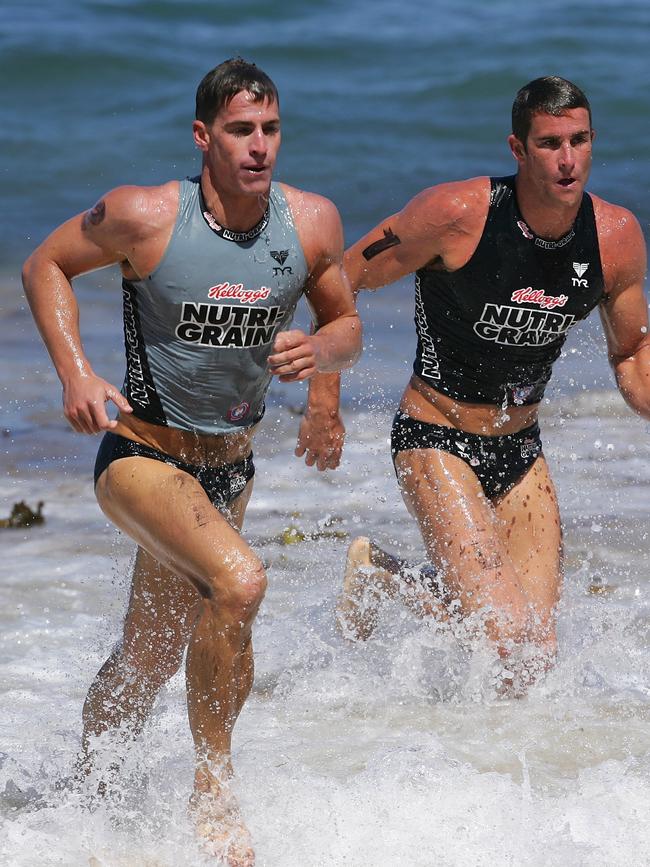
Did it make it harder or easier that you had to come up against him at training every day?
Shannon never seemed to have a bad day at training. His work ethic and the way he trained was always at an elite level but I was a bit more up and down. Some days, I could beat him at training but some days, I couldn’t get near him. He was always on that one level but I’d go from up above it to down below it. I think it made us both better athletes because we’d push each other at training every day and race on the weekend against each other as well.
ECKSTEIN’S SURPRISING NEW ROLE
GOING OUT ON A HIGH
You were forced to retire due to a chronic back injury. What was it like not being able to end your career on your own terms?
I guess every athlete wants a fairytale ending but I think everything happens for a reason. In my mind, I only had another year in me. I was starting to take shortcuts at training and losing motivation to train. I was hanging in there for the money which doesn’t get you out of bed in the morning. The worse thing, I think, for athletes is hanging on too long and fading out. I think I won two races in my final year so I was still winning. In hindsight, it was probably a blessing because I wasn’t getting any faster.
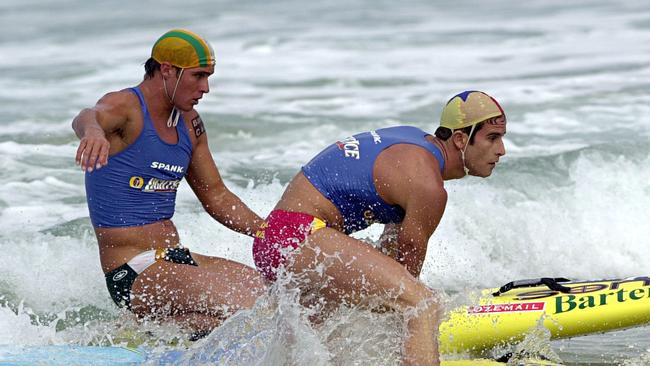
You were lured out of retirement last year for the world ironman series in Bali. Was it pretty surreal racing against current day stars, let alone in Bali?
It was such a good opportunity to be involved again. I loved being a part of it but I didn’t love the training, I didn’t do enough. I thought I could just do it, in my head. Iron racing is hard enough when you’re 27, let alone 37.
Beyond all that, you’re also raising your three kids here on the Gold Coast. Can we expect to see the Holmes name enter a third surf lifesaving era?
Possibly. I’m not going to push them that way. They’ll do Nippers. I think every kid should do Nippers. By my natural influence, they’re already in the ocean. That’s pretty much all they do, go to the beach. If they want to do it, I’ll back them but I won’t be forcing them to.
WORKING OUT LIFE AFTER SPORT
In 2004, you bought into your dad’s business, Dolphin Surf Craft, and you’re now a part- owner. Did you always want to be involved in the sport in retirement?
I guess so. When you’ve grown up doing it. I’m glad to still be involved in it. Sometimes it can be a bit much when you’re working in the environment and have events on the weekend as well. Summer is always full-on. I don’t know what I’d be doing if I wasn’t doing this.
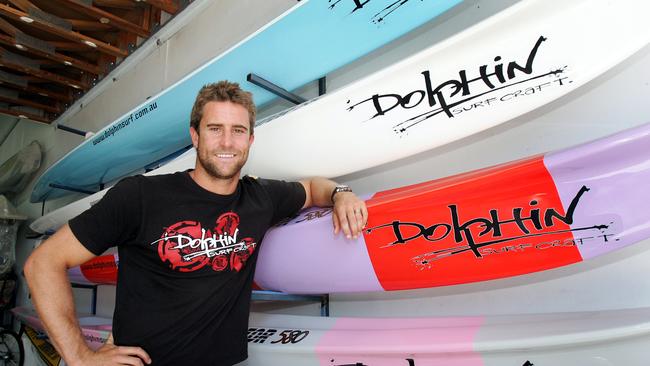
You also dipped your toe into the coaching space with Burleigh Heads. Was it an easy progression from competing to coaching?
Not really. It was easy in that I knew how I used to train and what you have to do to achieve. The hardest thing I find is that good athletes don’t necessarily translate into good coaches. You need to be able to articulate what you say. Good athletes have natural talent but to try to explain how you do that is difficult. That’s the hardest thing I’ve found, translating things that I think are really simple. I’m learning as I go.
Fact File
Age: 38
Born: Gold Coast
Career:
■ Five-time Nutri-Grain Ironman Series winner
■ 2006 Coolangatta Gold champion
■ Australian ironman champion
■ World ironman champion
■ Queensland ironman champion
■ Represented Australia 12 times
■ Co-owner of Dolphin surf craft


